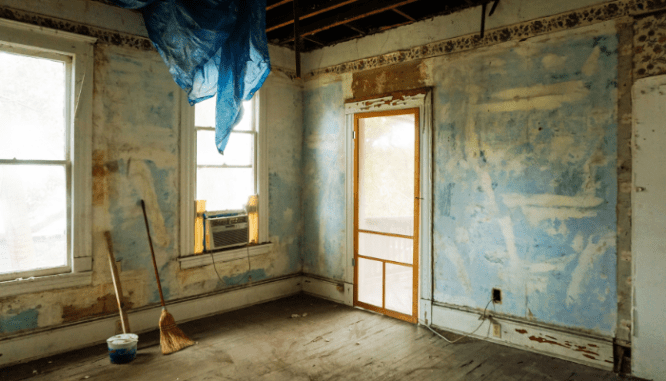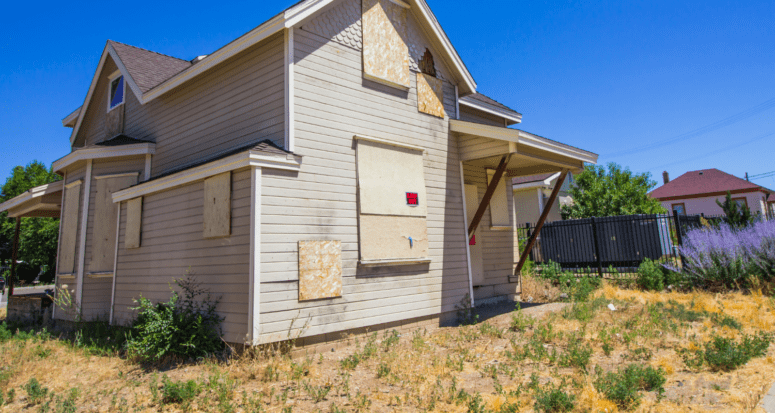All About Investing in Foreclosures: A Guide for Brand-New Buyers
- Published on
- 7 min read
-
 Summer Rylander Contributing AuthorClose
Summer Rylander Contributing AuthorClose Summer Rylander Contributing Author
Summer Rylander Contributing AuthorSummer Rylander is a freelance writer and editor with an abundant background in real estate. A former residential real estate agent in the Columbia, SC area and sales administrator at a commercial real estate firm, she now uses this experience to help guide readers. Summer currently resides in Nuremberg, Germany, where she fulfills her passions of food and travel and avoids her dislikes of mayonnaise and being trapped in an office.
Whether you’re looking for a one-time renovation project or you’re hoping to start a profitable business of buying and selling houses, there’s a steep learning curve when it comes to investing in foreclosures. From understanding the stages of the foreclosure process to knowing how to assemble a team of experts who can help you navigate your new project, you’re in for a challenging — and exciting! — ride.
To help get you started, we’re talking to industry experts and assembling our best tips all about investing in foreclosures. Let’s jump right in.
What exactly is foreclosure?
While foreclosure can yield great deals on properties for a savvy investor, there’s an underlying human element that buyers should keep in mind.
Foreclosure is a legal process following default on a loan. Usually, this means that the homeowner has missed several monthly mortgage payments, and now the lender is attempting to recoup funds by seizing and reselling the home.
Foreclosure regulations will vary by state and the specific terms set forth in each mortgage agreement, but generally speaking, foreclosure is a result of financial hardship suffered by the borrower.

The stages of foreclosure
The process of foreclosure can take anywhere from six months to well over a year, depending on the state and individual circumstances. For keen investors, there are opportunities to pursue homes at each stage of the process.
If you’re new to the game, working with an agent who is experienced in buying foreclosures will be essential to finding properties and navigating this unique buying process.
Pre-foreclosure
As the term implies, pre-foreclosure is the point where a homeowner is behind on their mortgage payments, perhaps far enough that they have received a notice of default. The notice of default will indicate how much time the borrower has to catch up on their loan before the property is seized by the lender, and these notices are typically public record.
Investing at the pre-foreclosure stage is similar to a conventional home purchase in that you’ll have the chance to walk through the home, order an inspection, and secure financing if necessary.
The downside is that competition for homes in pre-foreclosure is high, since the property is often still in good condition and can likely still be sold at a favorable price. From the current homeowner’s perspective, selling while in pre-foreclosure can be a welcome lifeline when the home is worth enough to recover debts and satisfy the balance of the mortgage.
Short sale
A short sale occurs when a homeowner is delinquent on their loan but the house is not worth enough to satisfy the remaining balance on the mortgage. The lender must sign off on a short sale, as they are effectively agreeing to settle debts for less than what is rightfully owed.
While you’ll still be able to walk through, inspect, and obtain financing for a short sale home as an investor, there’s typically less room for negotiation and less opportunity for a great deal; few lenders are willing to let the property go for significantly below market value.
Foreclosure auction
A property typically becomes available for auction when the home has legally been foreclosed.
While processes will vary from state to state, foreclosure auctions allow for a quick recoup of funds. Sometimes banks will set a required minimum sale price, and sometimes they’ll simply sell to the highest bidder — which can translate to big savings for foreclosure investors who are willing to take a chance.
Homes that are up for auction are sold on an as-is basis, which means that there are no walk-throughs or inspections. Securing financing for an auction property can be difficult, so consider this a cash-is-king situation. If the property can be financed, you’ll need the full down payment amount available at the time of your bid.
Finally, keep in mind that auctions are fast-paced and there’s a lot of competition. You’ll need to be prepared to act quickly.
Bank-owned
Also referred to as real estate owned (REO), these are properties that did not sell at auction and are now fully owned by the bank. Since the pressure of the auction is off, you’ll often be able to walk through and perform inspections — without electricity or running water, in most cases — if you’d like, but you’ll still be limited in your ability to ask for repairs or allowances.
Bank-owned or REO homes will be listed at their appraised market value, so discounts may not be as deep as you might anticipate from a foreclosure. On the upside, there can be less competition to buy these homes, and you’re back in the realm of financing possibilities if cash isn’t your preferred option.
Distressed loan bulk-buys
While this approach is less common for first-time investors, some experienced foreclosure investors will purchase distressed mortgage loans from lenders in bulk.
These investments require a lot of upfront cash to acquire the loans, but there’s money to be made if homeowners can catch up and continue paying their mortgage, or if homes are already vacant and ready to be prepared for tenants.
Is it better to fix and flip, or buy and hold?
No matter which path you take to find your foreclosure investment property, you’ll need to have a plan for what comes next.
Fixing and flipping a foreclosure
This is when a buyer purchases a house below its market value, then goes in and makes any necessary repairs or value-adding upgrades with the intention of selling the property for a profit.
While many folks have built successful businesses out of flipping houses (just look at all the fixer-upper shows on HGTV!), putting the finishing touches on a foreclosure is no guarantee of forthcoming riches.
“There [can be] so many hidden costs,” warns Jennifer Young, a top real estate agent with 19 years of experience selling homes in the Cincinnati, Ohio, area.
“A house may look good from the surface, but when you start getting in there… People are [sometimes] angry that they were losing their house. They might steal things or destroy the house, cut the wires and so on — it can get very expensive, very quickly.”
Being mindful of your budget is critical when it comes to purchasing a foreclosed property with the intention of flipping it. If you pay too much for the house itself, spend too much on renovations, or aren’t able to fetch your intended resale price, then you could end up losing money on your investment.
“Generally, it’s the area and the price that dictate whether a house might be a rental or a flip for me,” says John Durham, a top real estate agent based in Atlanta, Georgia. Durham is a foreclosure investment expert who owns more than 20 rental properties and estimates that he has been involved with flipping approximately 500 houses over the last two decades.
He notes that there are fees for selling a house — between agent commissions, marketing fees, and closing costs — so if margins are thin on your investment, it may make more financial sense to keep the property as a rental.
Buying and holding a foreclosure
This is a popular option for first-time foreclosure buyers, as holding a rental property can be an effective way to generate passive income. Once the house is purchased, renovated, and ready for a tenant, you’ll have two starting points:
- Short-term renting. Depending on the home’s location, it may be feasible for use as a short-term or vacation rental. Platforms like Airbnb and Booking.com have made it easy for property owners to connect with travelers and holidaymakers to rent out their homes for flexible, customized lengths of time.
- Long-term renting. Alternatively, you can seek a long-term tenant and not have to worry about vetting new applicants and deep-cleaning the property every few weeks or months.
In either situation, you’ll need to decide whether you wish to manage the process yourself, or whether you’d prefer to place the home with a property management company.
“If this is your first rental property, I would say to hire a management company,” advises Durham.
He notes that if you have a background in construction or real estate and have an idea of what to expect, you may be fine to manage your own rental — but sometimes these things are best left to professionals.
“You’ll hear stories from people who’ve had a rental and say they’ll never own one again because they don’t want to be unclogging toilets in the middle of the night,” says Durham. “Well, I have 20 rentals, and I never unclog a toilet that isn’t my own; but those are the kind of horror stories you’ll hear because people try to do it on their own, and they don’t know what they’re doing.”
Fixing wayward toilets is only a fraction of the work involved in managing rental properties, and the task starts with understanding the fair-market rental rate for your house.
Ideally, you’ll be able to rent out the property for a higher amount of money each month than your mortgage costs you to pay — thereby earning a profit — but you’ll also need to factor in property management fees, as well as maintain a buffer of cash for emergencies and repair needs that may arise during tenancy.
Your management company will help you determine a fair rate, but if you’re going at it alone, you can get an idea of where to start by researching your local rental market. Consider:
- The district or neighborhood in which your rental property is located. What are nearby homes of similar size and amenities renting for?
- Availability of rental properties. Is your market saturated with vacant rentals, or are would-be tenants struggling to find available homes?
- Length of desired agreement. Are you aiming for short-term or long-term tenants? Long-term rentals may earn a lower dollar amount each month, but the income will be more stable.

Finding your first foreclosure
So, you understand how foreclosure purchase opportunities arise, and you know what to keep in mind when deciding on what to do with your future investment property; now it’s time to start searching for a house.
Work with the right agent
It’s worth reiterating the importance of working with an agent who is experienced with foreclosures. Not all agents are interested in this side of the business, which is understandable when considering how time-consuming it can be to hunt down distressed properties and prepare (likely multiple) offers in what is often a high-competition, low-earning scenario.
These agents, even if they do agree to work with you after a consultation chat, are also less likely to have awareness of their local foreclosure market.
“A lot of the banks right now are doing auctions, and there are literally hundreds of different auction sites,” says Young. “The average Realtor isn’t going to know where to look for these sites or find information on these properties. [A foreclosure specialist] will have more of an inside track to what might be coming up if they’re working with a bank or getting foreclosure listings.”
Understand that selection may be limited
The COVID-19 pandemic of 2020 has sent the nationwide real estate scene into a frenzied seller’s market of low inventory and multiple offers, so — quite honestly — if you’re reading this article in the midst of coronavirus, understand that right now may prove a challenging time to make your foray into foreclosures.
“For somebody looking to buy a foreclosure, they need to expect to overpay in this market,” says Young, speaking to current conditions in Cincinnati. “They need to expect that the property is probably going to be in deplorable condition and missing a lot of the major components, like furnace or hot water heater, messed-up plumbing, that kind of thing.”
From his base in Atlanta, Durham agrees that foreclosure inventory is low, but he remains optimistic for those who are willing to be flexible and trust their agent.
“You need to find a good agent and listen to them, you know? If your agent says, ‘Hey, we’re going to make a blind offer,’ and it’s your first time and you’re freaking out going, ‘No way,’ you should probably listen to them,” says Durham. “As long as they’re competent, you’ll be much better off.”
In a more balanced real estate market that offers some choice with inventory, certainly it’s worth doing your research to identify neighborhoods in which your investment will carry less risk. Foreclosed homes that can be acquired for a great price in areas with solid infrastructure, new development, good schools, and job growth have high potential to turn a profit whether you flip or rent thanks to the desirable location.
Deeper research into surrounding home values and the types of homes that are in demand (both for purchase and for rent) will yield more clues as to whether your investment property is most suitable for flipping or holding.
Assemble a team of experts
A knowledgeable agent is just one of the experts you should have in your arsenal as you pursue investment in foreclosures. From accessing funds to carrying out renovation work, even the most devoted do-it-yourselfer is likely to need a hand from time to time. Key players may include…
A loan officer
Unless you have the cash to purchase a foreclosure outright, chances are high that you’ll need a mortgage or some form of financing to purchase these homes. Developing a relationship with a loan officer or a trusted lender can offer a leg up when it comes to financing, particularly if you reach a point where you’d like to acquire multiple properties.
“Get to know your local banker,” suggests Durham. “And when I say banker, I mean a bank that has a local board.
“A local bank might be willing to look at you and your financial strength, they’ll look at the strength of the deal, and as you develop a relationship with them, they’ll be more likely to continue to do those deals as long as they make sense.”
Contractors and repair specialists
If you’re not a contractor by trade, you’ll be well-served to find one you trust as your go-to for your foreclosure projects.
A good contractor can help you assess repair needs, upgrade opportunities, and loop you into their network of specialists (think electricians, plumbers, landscapers, and so on) to accomplish tasks as efficiently as possible.
A property manager
As we mentioned earlier, putting your rental property into the experienced hands of a property management company can alleviate countless headaches when it comes to finding, vetting, and interfacing with tenants.
Property managers will market your property, they’ll collect rent and handle the general maintenance of the home, and they’ll consult with you if something major crops up. Service fees and scope of what you get in return can vary, so ask around and do your homework during the selection process.
Cleaning services
Cleaners can prove invaluable if you’re planning to use your foreclosure investment as a short-term rental with tenants regularly moving in and out, but a professional cleaning service can also put the final shine on a flipped property, or help you tackle the initial mess if you’ve found yourself with a real project on your hands. Ask for recommendations from your agent or other investors to find a top-notch cleaning team.

Go forth and go for it
However (and whenever) you choose to get into the business of investing in foreclosures, the best advice is to be flexible, keep an open mind, and don’t be afraid to take a risk.
“If you watch TV, you’ll know that flipping houses and being a chef are two of the hottest things in the world — everybody wants to do it,” says Durham.
“The flipping business is not the hardest; you don’t have to be the smartest person in the world to be able to flip a house. Get a good agent, they’ll tell you what [the house] is worth. Maybe get a second opinion and if [the house] is worth that, you’ve just got to figure out what you can get it for.”
Header Image Source: (ThomasPhoto / Shutterstock)
